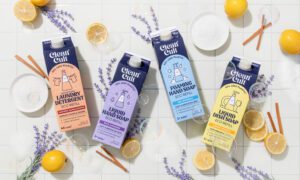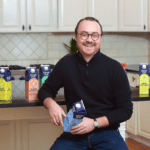Ryan Lupberger, co-founder and CEO of Cleancult, wants his cleaning products to be everywhere. And the consumer brand manufacturer took a leap closer to achieving this in March, when it rolled out its products in 3,000 Walmart Inc. stores.
Cleancult sells nontoxic cleaning products, such as soap and laundry detergent, in a cardboard carton. Shoppers then transfer the product into a glass bottle, which the brand also sells. Cleancult’s mission is to reduce plastic consumption, and it has 15 patents on the machines it uses to create its cartons.
Cleancult is not the first brand to tackle reducing plastic packaging in the cleaning industry, as other brand manufacturers sell cleaning products in 1-ounce concentrated glass bottles or sell products in powder form. This appeals to eco-conscience shoppers, but many consumers are not ready for this step, Lupberger says. While concentrated products are lighter, require less packaging and are more sustainable to ship than traditional products, it requires effort for customers at home to create the final product, which is a barrier, Lupberger says. Although Cleancult customers need to purchase a glass bottle in addition to its cleaning products, Lupberger says this is not a barrier to purchase.

Cleancult’s products are packaged and shipped without plastic.
“We want to go after the 99%,” Lupberger says. “We have to meet them where they are with ready-to-use formulas and ready-to-use bottles.”
“How do we change the category, but not change consumer behavior?” he adds about its goal to make choosing its plastic-free products easy for shoppers.
Cleancult.com launches and then pivots to physical retail
Cleancult launched in 2019 with its direct-to-consumer website Cleancult.com.
“I really hoped D2C would work long term,” Lupberger says.
But things quickly changed. As online sales skyrocketed during the pandemic — especially for cleaning products — so did costs. Digital marketing costs to acquire customers and shipping carriers raising their rates were the largest increases, he says. Digital marketing costs increased roughly 50% from 2019 to 2021, Cleancut says. Plus, what once cost the brand $6-$7 to ship now costs it $17-$18.
Plus, post-pandemic, many consumers resumed their normal shopping habits, including buying their cleaning products in stores. And so, Cleancult shifted priorities to get its products in more physical stores instead of working to acquire digital customers. In 2021, Cleancult debuted in a handful of regional grocers. In 2022, it expanded to Walgreens, CVS, and Bed Bath & Beyond, and this year is Cleancult’s Walmart debut. Cleancult also sells on the Walmart and Amazon.com Inc. marketplaces.
Amazon is No. 1 in the 2022 Digital Commerce 360 Top 1000 database. The Top 1000 ranks North American web merchants by sales. Walmart is No. 2. Amazon is No. 3 in the Digital Commerce 360 Online Marketplaces database, which ranks the 100 largest global marketplaces. Walmart is No. 9.

Ryan Lupberger, co-founder and CEO of Cleancult.
“A lot of categories shouldn’t live online,” Lupberger says. “Fundamentally, the cost of shipping big, bulky, low-price items, doesn’t work very well.”
Subsequently, its sales shifted from 100% via its direct-to-consumer website, to 90% its own website in 2020, 70% in 2021, 65% in 2022 to likely 20% in 2023, Lupberger says. Cleancult includes sales made on the Amazon marketplaces in its direct-to-consumer sales figures.
Even though sales are growing 50% year over year for its total business, sales are flat on Cleancut.com.
This shift in sales is fine with Lupberger, as its ecommerce site and Amazon business do not make money.
“It’s break even at best,” he says.
But its ecommerce site still serves a purpose, including building a community and testing new products and scents, he says.
“If they find us in store and believe in the Cleancult brand, join the website. But if they need a quick shipment, buy on Amazon. And if they are grocery shopping, they can pause their subscription and buy from the grocer,” Lupberger says.
Plastic-free shipping packaging
For shoppers who do buy direct from Cleancult.com, the brand works to ensure the products are shipped in the most sustainable way, such as by offsetting the carbon from the freight and by using paper instead of plastic.
“We can’t use plastic. It can’t ruin our value proposition,” Lupberger says.
Cleancult uses corrugated paper to pad its products, which is typically two to three times more expensive than a plastic polybag filler. It also pads its glass bottles with carboard beds to ensure the products are not touching anything and there is space for crushing.
The brand uses Forest Stewardship Council certified paper for its product cartons and shipping boxes. FSC is a nonprofit organization that ensures the paper is from a forest that is responsibly managed for environmental, economic and social benefits.
Cleancult has four box sizes, and 99% of its orders arrive in one box. This means an order with multiple products is not split up into multiple shipments.
The last person who packs the box is the last quality control to ensure it is packed correctly, with none of its products touching. While this is important to its plastic-free ethos, it’s often thankless.
“[Shoppers] don’t notice it when it arrives,” Lupberger says.
But shoppers do notice when there is plastic in the shipping box by mistake. This can happen for some of its Amazon.com orders, which is shipped via Fulfilled By Amazon. Cleancult provides Amazon with its own carboard boxes to use to ship directly to shoppers. Sometimes, however, a warehouse employee may put that box inside another box with a polybag in it, or its box is added to another part of a larger order and plastic is added. Then, shoppers contact Cleancult with negative comments, even though this is outside of its control, Lupberger says.
Cleancult is No. 1963 in the 2022 Digital Commerce 360 Next 1000.
Sign up
Stay on top of the latest developments in the ecommerce industry. Sign up for a complimentary subscription to Digital Commerce 360 Retail News.
Follow us on LinkedIn, Twitter and Facebook. Be the first to know when Digital Commerce 360 publishes news content.
Favorite